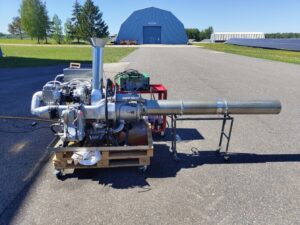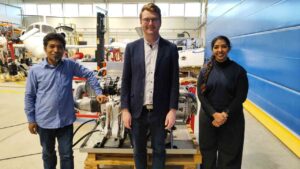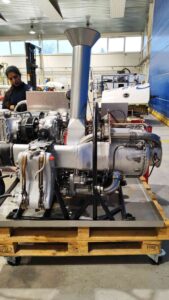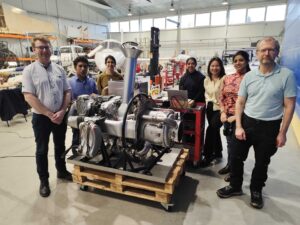Thematic research & development programs (TemTA-144 (EMÜ & EAVA))
Development of nano-additives to optimize jet fuel combustion and reduce carbon footprint
The research team regroups PhD students, researchers and professors from Estonian University of Life Science and Estonian Aviation Academy. The main goal of the project is to develop solutions based on nanotechnology to make biofuel suitable for air freight and airplane and decrease the carbon foot-print of air freight to mitigate climate change and reduce pollution from this human activity.
Goals of the project:
Climate change is already affecting our daily lives due to the greenhouse effect produced by the massive consumption of fossil fuels. Combustion engines are still a necessity in air freight due to the lack of suitable replacements available, even biofuels (SAF) are not suitable. To enable a smooth energy transition, it is necessary to reduce the carbon footprint and harmful emissions in the short-term. Nano-additives in fuel are a promising alternative. They can promote a better combustion, increase the engine power and yield and thus promote the reduction of harmful emission and make biofuel suitable for air freight. Plant extracts from waste used for the synthesis of nano-additives will ensure eco-friendly and cost-effective process, in turn promoting circular economy and waste reduction. The technology can be horizontally translated to maritime transport, house heating using fossil fuels, to reduce harmful emissions and combat climate change by decarbonizing energy consumption. This research project is funded by Sihtasutus Eesti Teadusagentuur(ETAg).
News and Project updates
30/01/2025
Today, we successfully tested the gas turbine for the combustion tests. The gas turbine is equipped with different sensors to control the combustion and turbine functionning. All parameters are monitored on live. Thanks to Neethu, Shafiqu and Madis for their excellent work. Most of the reseach team was there for the first test and you can watch the video of the first test HERE! Congratulations to all the team!



08/11/2024
A first movie that highlights success stories related to TemTA program has been showed at Mustamäe Apollo cinema in Tallinn, and it is now available to anyone here. The new program helps to make research projects more relevant to society’s needs.
13/06/2024
Congratulations to our Masters student Richard Erelt who successfully defended his Masters thesis on Assessment of Nanoparticles-Based Additives in Jet-Fuels Combustion. During the defense, the whole jury recognized unanimously the well performed research work.
Senior research team:
- Prof. Erwan Rauwel
- Prof. Protima Rauwel
- Dr. Priyanka Panchal
- Dr. Glemarie Hermosa
- Dr. Olga Liivapuu
PhD students:
- M. Karl-Eerik Unt
- M. Patricio Paredes
- M. Shafiqul Islam
PhD students:
- M. Madis Parv
Former Participants:
- M. Richard Erelt (Master thesis)